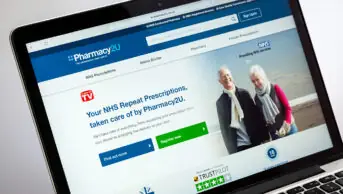
Shutterstock.com
Online prescribing has long operated in a regulatory grey area, with some online pharmacies evading oversight by exploiting technical loopholes in the law.
These loopholes not only allow online pharmacies based overseas to bypass UK regulators and dispense to British patients, but also enable patients to keep the details of these prescriptions hidden from their GP and their patient record, if they choose to do so (see Box).
On 28 July 2017, Debbie Headspeath died of a drug overdose aged 41 years, after spending more than £10,000 on codeine from 16 different online pharmacies in the space of six months. The coroner’s report, published on 27 December 2019, revealed the human cost of such loopholes.
Headspeath’s GP, who had initially prescribed the opiates for her back pain, was unaware of her extensive use of online pharmacies, because, the coroner Nigel Parsley noted, she had “identified how to manipulate the systems in place”.
In his report, Parsley highlighted the regulatory gaps in the system that allowed Headspeath to fall through the cracks of online pharmacy.
“There is no single database that allows a prescribing clinician to identify what prescription-only medication has already been prescribed to any particular patient,” the report said.
“Before being able to do this, they would need to obtain the patients’ express permission.”
Parsley also noted his concern that “this system was totally ineffective in [Headspeath’s] case,” allowing her to obtain the lethal quantities of codeine that ended her life.
Box: Who’s regulating whom online?
In August 2017, eight regulators wrote to providers of NHS services outlining the challenges online healthcare provision present “by transforming how care is delivered and blurring the geographic borders”.
As a result, the Care Quality Commission (CQC), General Medical Council, General Pharmaceutical Council (GPhC), Nursing and Midwifery Council, Medicines and Healthcare products Regulatory Agency (MHRA), Healthcare Improvement Scotland, Healthcare Inspectorate Wales, and the Regulation and Quality Improvement Authority all committed to sharing intelligence about online providers to improve regulatory coverage.
However, because of the way the system is structured, it is not immediately clear who is regulating whom when it comes to supplying medicines online.
Although the CQC regulates some online primary care providers, it only does so if they employ a healthcare professional listed in the CQC’s ‘Scope of registration’ document, which does not include pharmacists or pharmacist prescribers.
The regulation of pharmacists working in registered pharmacies online falls under the remit of the GPhC.
However, the GPhC said in April 2019 that it would fully support the CQC taking on the regulation of pharmacist-run online services outside of a registered pharmacy, in an effort to catch online dispensers that fall through the cracks between the two regulators.
The MHRA, which regulates medicines and medical devices, is also looking to tighten regulations online by raising public awareness about fake medicines.
Despite this, none of the eight regulators are currently able to regulate providers that prescribe to UK patients from outside the UK. The CQC says it could close this gap as it continues to work with other regulators and the government on addressing these issues. However, this could change after Brexit, when the GPhC would no longer be bound by EU law, which states that an online pharmacy’s regulator depends on the location of the healthcare professional, rather than the patient.
Guidance or advice
As part of a cross-regulator endeavour to close gaps in the system, the General Pharmaceutical Council (GPhC) published ‘Guidance for registered pharmacies providing pharmacy services at a distance, including on the internet’ in April 2019.
The document states that, when patients choose to withhold their consent for their GP to be contacted about an online prescription, the prescriber is still required to make “a clear record setting out their justification for prescribing”.
However, in his report, Parsley questioned whether this guidance “is advisory and not mandatory”.
“There is some uncertainty as to what sanctions would be available against any supplying pharmacist who chose not to adhere to the new guidance,” he says.
An analysis of GPhC inspection reports by The Pharmaceutical Journal suggests almost a quarter of online pharmacies are regarding the guidance as advisory.
The analysis revealed that 11 of the 45 online pharmacies whose reports were published on the regulator’s website were supplying medicines without either informing the patient’s doctor or recording a justification for proceeding with the prescription.
Nevertheless, the regulator insists that its guidance is both mandatory and enforced.
“Failure to follow the guidance would be evidence that the pharmacy is not meeting our standards and enforcement action may be taken,” says Duncan Rudkin, chief executive of the GPhC, adding that action has already been taken against online pharmacies that have inappropriately supplied high-risk medicines to patients.
If a patient doesn’t want their data shared, it should ring alarm bells with any self-respecting healthcare professional
“In most of these cases, we have imposed conditions restricting the sale or supply of opioids and other controlled drugs by the pharmacy,” and a “a number” of pharmacy professionals have been referred to the GPhC’s fitness-to-practise process, he explained.
While Sandra Gidley, president of the Royal Pharmaceutical Society, says that there is “nothing wrong” with the GPhC guidance, she thinks the regulator “can look more closely” at instances where no justification for prescribing is given.
“There might be a need for greater guidance for what would be a justification,” she says. “I think those cases would be few and far between, and if a patient doesn’t want their data shared, it should ring alarm bells with any self-respecting healthcare professional.”
“My personal view is that in this case you shouldn’t supply,” she adds.
Legal loophole
Gidley’s view is largely supported by guidance issued to prescribers by the Care Quality Commission (CQC) and the General Medical Council (GMC).
In the latter’s ethical guidelines, it states that doctors should “ask for the patient’s consent to contact their GP if you need more information, or confirmation of the information you have, before prescribing”.
But it continues: “If the patient objects, you should explain that you cannot prescribe for them and what their options are.”
The GMC’s ethical guidelines for remote prescribing are referenced in the CQC’s guidance for online providers, which — as Gidley suggests for pharmacy — provides greater clarity on the decision-making process required before prescribing to patients without contacting their GP.
“Where the clinician does not have consent to contact the registered GP or there is no registered GP, they have explored this with the patient, and lack sufficient and reliable enough information to provide a safe prescription, they should decline to prescribe and signpost the patient to suitable alternative services,” it states.
Any attempt by a patient to obtain opioids online should cause concern
The guidance adds that if the clinician decides to prescribe “without informing the NHS GP following the episode of care … this should be clearly documented in the patient’s notes, together with any advice, monitoring arrangements or follow-up required”.
However, Gidley says that any attempt by a patient to obtain opioids online should cause concern.
“People resorting to online pharmacies to get opioid medicines generally have a problem — not 100%, but in the vast majority,” she says. “Legitimate prescriptions are available free of charge on the NHS or, if you don’t get free prescriptions, much cheaper than you would pay online for codeine.”
“I can’t believe any pharmacy graduate, let alone someone who’s been through the preregistration exam, is unaware of the problems with overprescribing opioids and those who try to flout the system to get them,” she continued.
However, online pharmacies have told The Pharmaceutical Journal that they are bound by law to offer patients the option to withhold information about their online purchases from their GP.
Protecting data over safety
A spokesperson for the Nottingham-based online pharmacy, UK Meds — 1 of the 16 pharmacies used by Headspeath — says it adheres to the Data Protection Act 2018 and its EU equivalent, the General Data Protection Regulation (GDPR), when it provides a tick box asking whether a patient’s GP can be contacted.
According to the legislation, the data protection laws aim to “protect individuals with regard to the processing of personal data, in particular by … requiring personal data to be processed lawfully and fairly, on the basis of the data subject’s consent or another specified basis”.
However, Gidley says this application of data protection laws for online pharmacy “is concerning”.
“It is something we need to take a look at and work with the regulator on [to decide] whether we should be lobbying for a change in the law when it comes to this. We don’t want to see anyone else die — that’s the bottom line,” she says.
While it is unclear whether Parsley considered this loophole in EU law when he concluded that the health and social care secretary and his department “have the power” to take action to prevent future deaths, other regulators are hinting at changes to their remit.
Vicki Wells, deputy chief inspector of primary care and lead for online services at the CQC, says the organisation has been working “tirelessly” to protect people from harm when receiving services from online providers, including stopping providers from operating where there are concerns about safety.
“We are absolutely clear that if people are being exposed to risk because services are set up in a way that avoids or minimises the scrutiny designed to protect them, then something needs to change,” she adds.
However, whether anything will change as a result of Parsley’s report remains unclear.
The GPhC says it plans to respond to the coroner’s report “and will continue to take necessary action to make sure medicines are always supplied safely online” but gave no suggestion that any changes would be made to its guidance.


